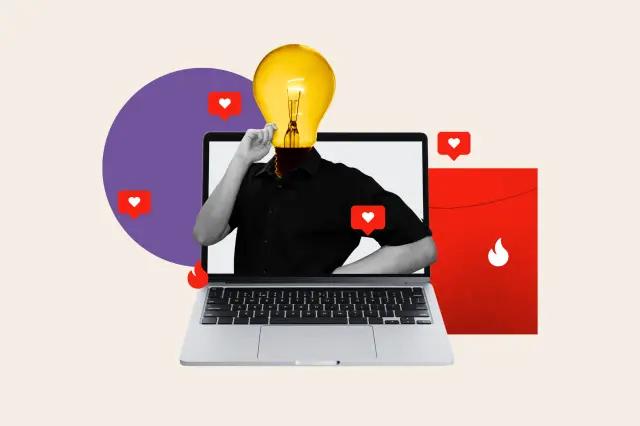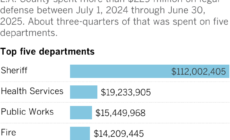-
Los Angeles man dies in accident at Northern California ski resort - 36 mins ago
-
Bud Cort, Who Starred in 1971’s ‘Harold and Maude,’ Dies at 77 - 45 mins ago
-
Lawmakers Question Bondi Over Justice Dept. Under Her Watch - about 1 hour ago
-
2 Olympic Skiers Banned After Shocking Qualification Round Incident - 2 hours ago
-
Woman ‘Bewildered’ By BF’s Dark Take On Relationship: “No Value” - 2 hours ago
-
Baby, 17 Days Old, Found Dead From Fire That Killed Her Mother - 2 hours ago
-
L.A. man who went on seven-day tree-slashing rampage is sentenced - 3 hours ago
-
Chiefs’ Andy Reid Won’t Retire Before Closing Piece of Unfinished Business - 3 hours ago
-
Four States Sue Administration Over Loss of Public Health Funds - 3 hours ago
-
Bears’ Caleb Williams to Compete in NBA All-Star Weekend Event - 3 hours ago
How Smart Became The New Hot Online
The Instagram account @hotdudesreading has over a million followers. The fashion girls are rolling the holy roster of Miu Miu glasses, a gray cardigan and chunky loafers. Emerald Fennel is adapting Emily Bronte’s Wuthering Heights, Taylor Swift is referencing Shakespeare’s Hamlet and a clip of The Kid Laroi reading Julia Fox’s memoir Down the Drain, has been viewed over 750,000 times on TikTok.
What do these things all have in common? Well, they’re all reflective of the fact that there’s a new sheriff aesthetic in town. As the usage of AI skyrockets, reading rates decline and if the headlines are to be believed, people are becoming less and less intelligent, people online are all striving to be seen in a new way.
That’s right, smart has become the new hot.
The Great Intelligence Performance
For years, social media has traded in the currency of hotness. Whether it’s thirst traps, clothing hauls or beauty tutorials, social media has long run with a clear message—that how you look matters, often above all else.

But over the past few months, something has shifted, and a new cultural currency is being spent.
Jo Littler, a Professor of Cultural, Media and Social Analysis at Goldsmiths, University of London, England, told Newsweek, “Social media rewards us with extended networks and the mini-dopamine hits of ‘likes’ for performing all kinds of identities online.”
“This is another one,” she said.
Over the summer, Google searches for terms like ‘performative reading’ and ‘performative men’ skyrocketed, and books-as-accessories became to 2025 what tiny dogs in handbags were to the 2000s.
Instagram is inundated with different celebrity-run book clubs, as It Girls pair highbrow hardbacks with ball gowns, seemingly every influencer now has an essay collection, and Miu Miu, one of the most popular fashion brands in the world, launched a fragrance ad that featured stacks of books, a typewriter, and of course, a pair of oval glasses.
This shift was reflected during the recent SS26 runway shows. Whether it was power tailoring on the runway, decorative glasses, or the office siren aesthetic, clothes that hint at an identity rooted in professional power and intelligence are more in Vogue than ever.
“Some of the satirical trends that commodify smartness, like ‘office siren’ or ‘hot girl’ or ‘performative male’ aren’t meant to be taken literally,” Jess Rauchberg, an assistant professor of communication technologies at Seton Hall University, New Jersey, told Newsweek over email.
“They are subversive critiques that use abstract humor to make larger statements about growing illiteracy,” she said.
And in a way, this isn’t surprising. Things become lucrative when they’re scarce. And that’s exactly what conventional intelligence and literacy have become.
The Reality Behind the Screen
Newsweek spoke to Mariah L Wellman, an assistant professor in the Department of Advertising and Public Relations at Michigan State University, about the trend. “This trend is happening now for a variety of reasons,” she said over email. “I think the decline in reading rates is one of them. People who do value intellectualism are showcasing that online, making it attractive for others and encouraging them to participate.”
As social media content featuring books becomes increasingly popular, literacy rates are dropping. A new paper, published in the journal iScience, showed that the number of Americans reading for pleasure dropped by roughly 40 percent between 2003 and 2023, to only 16 percent.
Beyond this, the rise of generative AI technologies has set off a host of panic alarms.
A study published in Societies in January of 2025 found that the growing reliance on these technologies could be undermining critical thinking skills. Meanwhile, a study ran by researchers at the Massachusetts Institute of Technology found that people who use large language models like ChatGPT to write essays have lower brain activity than those who didn’t.
“AI makes it easy to instantly generate text—both sophisticated and inaccurate slop. It’s not so surprising in this context that the material book is used or fetishized as a reliable counterpoint,” Littler told Newsweek.
Wellman, meanwhile, told Newsweek that the trend is “A sign, however, of an increased tension between the popular anti-intellectualist movement and its opposition, or those who hold expertise in a particular area and value that intelligence.”
“Experts are being drawn to social media to educate the public through actual displays of expertise, while creators are utilizing the trend of ‘performing intelligence’ or ‘aestheticized intelligence’ to rise in popularity online and draw attention,” she said.
And while the trend of performed intelligence is largely being driven by adults, the concerns about literacy rates and intelligence extend far beyond them.
In September, scores from a test from the National Assessment of Education Progress showed that the average reading and maths scores of 12th graders had plunged to their lowest level in more than 20 years.
With the AI revolution well underway, our relationships to media and information are continuing to develop. And in true digital age form, these responses are playing out online.
The Driving Force Behind The Trend
“Performative intelligence or smartness is a way to signal that you care about the ways AI tools and contemporary politics diminish intellectual exchange,” Rauchberg told Newsweek.
She then pointed to the “backlash,” to what she described as the “mindless” adoption of generative AI tools. And this backlash is pronounced, as are concerns about AI. An August poll from Reuters found that 71 percent of Americans are worried that AI will permanently put swathes of people out of work.
Beyond this, according to a poll from the Pew Research Center, U.S. adults are by and large pessimistic about AI and its effect on people’s ability to think creatively and form meaningful relationships. 53 percent said that AI would worsen people’s ability to think creatively, and 50 percent said AI would worsen people’s ability to form meaningful relationships.
Newsweek also spoke with Dr. Fabian Stephany, an assistant professor at the University of Oxford’s internet Institute, who discussed the trend and its driving factors.
“Machines are becoming remarkably good at summarizing, reading, and even writing—skills that once defined intellectual labor. This shift forces us to rethink what makes human intelligence distinctive,” he said.
“People might be performing intelligence—reading more visibly, writing in public, displaying their engagement with ideas—as a way to reassert human relevance in a moment when AI challenges our cognitive identity.”
“It’s a kind of reassurance,” he said.
In Rauchberg’s view, these trends are a moment of reflection of sorts to ask about the impacts of AI.
“Reality and fakery are blurred together,” she said, pointing to AI technology like Sora 2. However, these technologies “May actually increase our larger literacy issues about media and reality—and the moral panics about genAI may be rooted in more truth than we’re willing to accept.”
As with the majority of social media trends, it would be easy to dismiss the rise of performed intelligence as yet another viral moment in a vapid scrolling cycle. But, as Littler told Newsweek, “Any trend which counters anti-intellectualism has some positive potential.”
Our relationships to media and knowledge are changing rapidly, and there’s no blueprint for how they will evolve. The trend of performed intelligence, and evolution of smartness as a valued social currency could pave the way for an increase in interest in learning and reading.
Or this trend could go on to be a digital tombstone, in a future where books, physical media, and knowledge as we know it falls entirely out of fashion.
Full Interview Below
Newsweek’s interview with Mariah L Wellman, an Assistant Professor in the Department of Advertising and Public Relations at Michigan State University.
Q1: What social or cultural forces do you think are driving the rise of “performed intelligence” online?
I think performed intelligence is a social media aesthetic and trend, hence the focus on it being a “performance,” and not necessarily a sign of increased intelligence. It’s a sign, however, of an increased tension between the popular anti-intellectualist movement and its opposition, or those who hold expertise in a particular area and value that intelligence. Experts are being drawn to social media to educate the public through actual displays of expertise, while creators are utilizing the trend of “performing intelligence” or “aestheticized intelligence” to rise in popularity online and draw attention.
Q2: Why do you think esthetics like the office siren or “academic-core” resonate now, amid declining reading rates?
Office siren, in my understanding, is more of a sexualizing of women in the workplace, devaluing their presence and almost creating a caricature of what it means to be a woman in power. I don’t think it’s necessarily connected to an aesthetic of intelligence or speaks in any way to declining reading rates. Academic-core, however, is more connected to the aesthetic of intelligence. Not only is it reminiscent of particular fashion trends (think “dark academia” and vintage-inspired clothing, knit vests, trousers, etc.), it’s also a call to appreciate habits that reflect a level of intellect. This trend is happening now for a variety of reasons, and I think the decline in reading rates is one of them. People who do value intellectualism are showcasing that online, making it attractive for others and encouraging them to participate.
Q3: Do you see this trend as ultimately harmful, or could it paradoxically inspire renewed interest in intellect and self-improvement?
I don’t believe it can be this black and white. While there are certain people who might participate in these trends in the hope they will go viral online, there are also people who live their lives within the “academic-core” and similar trends. This might include spending more time reading and less time online, pushing against artificial intelligence and our reliance on technology, but it also might involve embracing scientific and technological advancements. It very much depends on the individuals’ goals and aspirations for being present on social media and crafting their persona.
Source link















